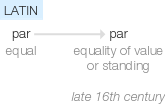Par
late 16th century (in the sense ‘equality of value or standing’): from Latin, ‘equal’, also ‘equality’. The golf term dates from the late 19th century.
wiktionary
Abbreviations
Borrowed from French par(“through, by”), from Latin per(“through”). Doublet of per.
Borrowed from Latin pār(“equal”).
par (plural pars)
etymonline
par (n.)
1620s, "equality in value or circumstances," also "value of one currency in terms of another," from Latin par "equal, equal-sized, well-matched," also as a noun, "that which is equal, equality," a word of unknown and disputed origin. De Vaan is noncommittal. Watkins suggests perhaps from PIE root *pere- (2) "to grant, allot," with suggestion of reciprocality. Another guess connects it with PIE root *per- (5) "to traffic in, sell" (on notion of "give equal value for"). Meaning "a standard fixed by consent or by natural conditions, average or usual amount" is first attested 1767. Golf sense is attested by 1898, which led to the figurative use of par for the course for "fairly normal, what can be expected" (by 1928).
par (prep.)
"by, for," mid-13c., from Old French par, per, from Latin per (see per). It figures in some French phrases borrowed into English and in the formation of some words ( parboil, pardon, parvenu). In some older borrowings from French it has been re-Latinized to per- ( perceive, perfect, perform, pertain).
